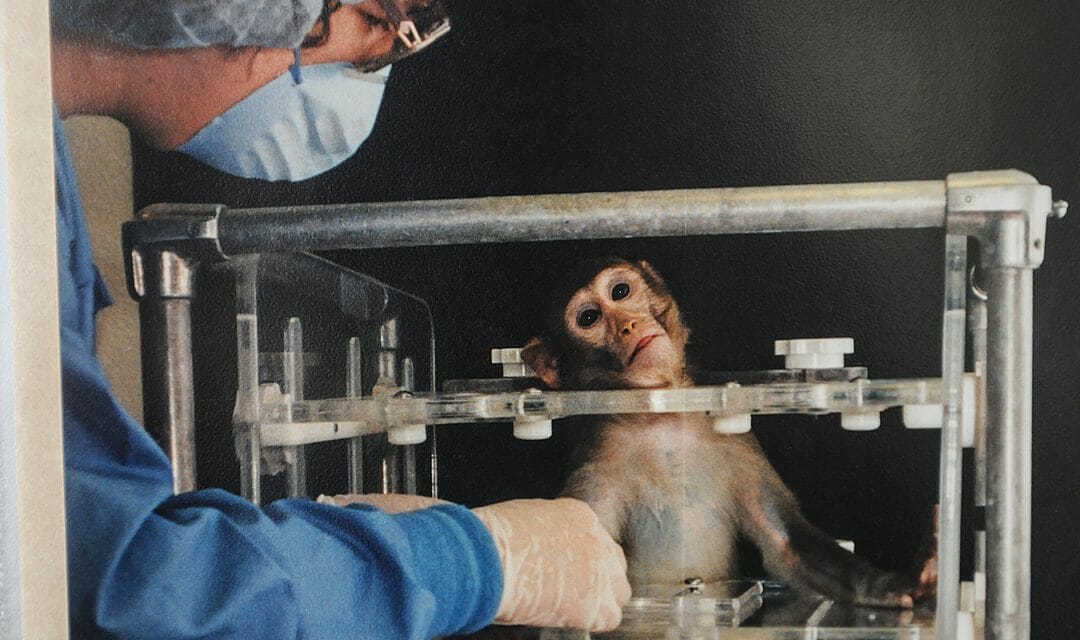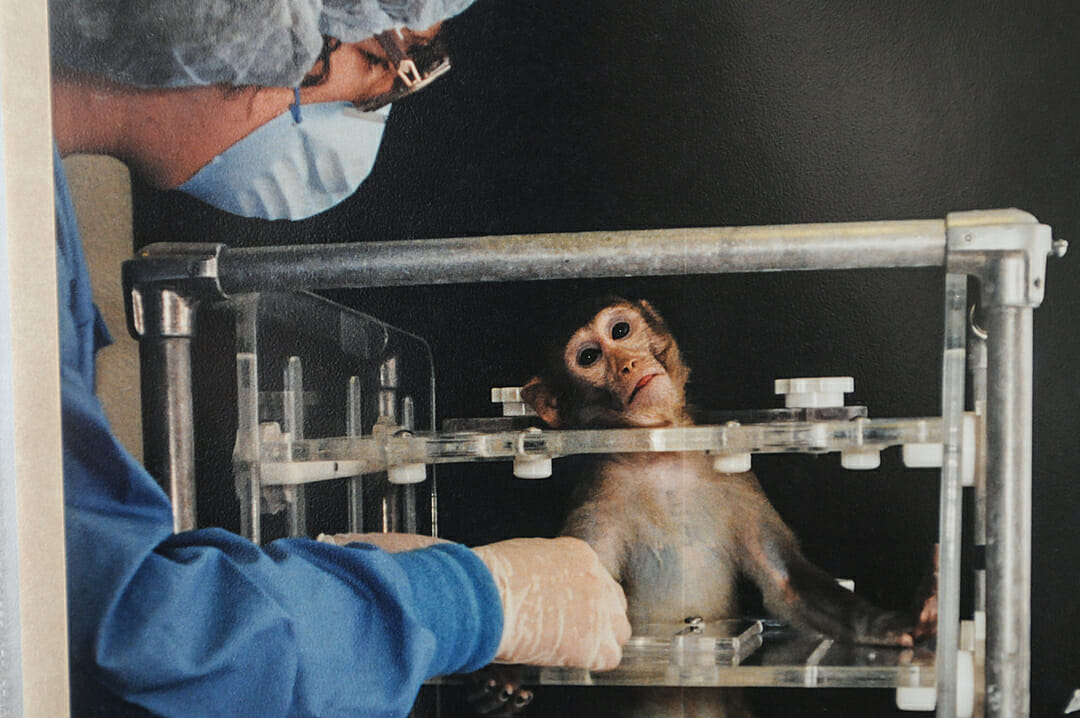Some of the more than 700 research monkeys on board a recent WAMOS Air Flight from Cambodia to U.S. laboratories died during the grueling journey, according to The Independent.
UK-based nonprofit Action for Primates learned that 720 long-tailed macaque monkeys were airborne in cargo holds for more than 24 hours on a Nov. 14 flight while traveling from Phnom Penh International Airport to Houston, Texas — a more than 11,000 mile journey that had a 6-hour layover in Georgia. An undisclosed number died in transit, the nonprofit alleged via press release.
An additional 1,440 macaques have made that same trek — with 720 flying out on Aug. 21 and another 720 monkeys flying out on Sept. 17, with a final destination at the Envigo research corporation in Alice, Texas, according to Cambodia News.
WAMOS Air declined comment for this story.
“Sorry but we have nothing to say, head to the lab, our client,” they wrote in a single-line email to Lady Freethinker (LFT).
Envigo also has not yet responded to LFT media inquiries.
An additional shipment of macaques originating on a July 21 flight from Cambodia to Houston ended up at Envigo, Action for Primates told LFT. Another shipment of macaques left from Mauritius to Houston on an April 27th flight, final destination unknown, according to Action for Primates.
The nonprofit, along with campaign partners One Voice (in France) and Stop Camarles (in Spain), are calling on WAMOS Air to refuse to charter flights for research monkeys, given that there’s no way to humanely transport the monkeys by air, said Action for Primates Co-Founder Sarah Kite.
“It is simply not possible to confine non-human primates to small crates, away from familiar surroundings, and transport them on long journeys across the world without causing considerable distress and physical and psychological suffering,” Kite said.
Wamos Air flight with hundreds of monkeys on board – destined for testing laboratories – is now flying from #Cambodia to the #USA. @Action4Primates & @onevoiceanimal call on @Wamosair to stop transporting #monkeys as cargo on its aircraft. #StopPrimateShipments #StopPrimateTests pic.twitter.com/MXKbucB4qD
— Action for Primates (@Action4Primates) July 21, 2021
Monkeys in cargo holds spend their flight time packed into tiny transit crates, where they also can endure inadequate ventilation, loud noises, and temperature and humidity fluctuations, Kite said.
That combination of stressful factors means many monkeys will become ill or die in transit, or otherwise become weakened and more susceptible to infection or disease, the nonprofit added.
The fate awaiting monkeys who arrive at labs also is gruesome. Envigo is a global contract research company that carries out toxicity testing, or seeing what amount of a substance can cause negative impacts in a body.
Toxicity testing in monkeys frequently involves restraining the animals — often by their necks to a “primate chair” — in order to inject varying doses of drugs. Common side effects include vomiting, seizures, breathing and skin problems, weight loss, internal bleeding, organ failure, and death, Kite said.
Biomedical researchers have seen increasing pushback from airlines about transporting monkeys in the last two decades, with the United Kingdom starting a campaign against the cruel transits in the 1990s and People for the Ethical Treatment of Animals (PETA) starting a push in 2011 in the United States, according to Science.
More than 80 international airlines have since refused to transport monkeys for research — including Alaska, United, Delta, Spirit, and Southwest airlines, as well as British Airways, China Southern Airlines, and Qatar Airways.
A legal challenge brought forth by the National Association for Biomedical Research against four of those airlines — saying their refusal would hinder scientific progress — failed to gain traction in 2018.
U.S. laws established in 1938 mandated testing drugs on animals before finished products can be sold for human use. Macaques are a preferred test subject, and the United States used 68,257 of them in 2019, according to the most recent data available from the U.S. Department of Agriculture.
Many of those monkeys — who are captured from the wild or bred on farms — are imported from overseas countries, including from China, Mauritius, Cambodia, Vietnam, and Indonesia. Imports of monkeys from Cambodia have spiked in recent years, with an almost 83 percent increase from 8,571 macaques imported in 2019 to 15,664 imported in 2020, according to data from Action for Primates.
That’s despite decades of evidence that animal test subjects can never be accurate stand-ins for humans, given undeniable genetic differences between species. It’s why 90 percent of drugs approved in animal tests fail in human clinical trials after they’re proved unsafe or ineffective.
The stress from being held in unnatural captive conditions likely weakens monkeys’ immune systems, making data from the animal tests that much more unreliable, Kite said.
“The stress or distress they experience in captivity — individually housed in small, barren cages, deprived of the freedom and the companionship of others, being handled and manipulated — has profound effects on their immune systems and physiologic responses,” Kite said via email.
Other issues that impact only human species — such as financial or psychological issues — also compromises trying to translate impacts in one species to another, she said.
Given those discrepancies, and a current research monkey “shortage”, Kite added there’s more urgency than ever to find human-relevant and humane alternatives to animal tests.
“It is disheartening that, rather than use the current ‘shortage’ to stimulate alternative and humane ways of medical research, researchers are just seeking new sources of monkeys, including calling for an expansion of non-human primate breeding facilities in the USA,” she said. “They persist in continuing to use sentient beings capable of suffering and who cannot give consent, instead of using their intellect and resources to develop humane methods of finding human-relevant, safe, and effective treatments for people.”
WAMOS Air, formerly Pullmantur air and a subsidiary of the Royal Caribbean Group, also operates charter flights to popular holiday destinations — making for a disturbing juxtaposition of operations ending in pleasure or pain, Kite said.
“Holiday makers will be shocked to learn that the airline flying them to their holiday of a lifetime in the Caribbean also flies hundreds of monkeys to their deaths in U.S. laboratories,” she said. “It is time for WAMOS Air to join the long list of airlines that now refuse to be a part of the cruel global trade in monkeys for research.”
You can sign the petition to stop this cruelty — spearheaded by Action for Primates, One Voice, and Stop Camarles, and available in English, French, and Spanish — here.









